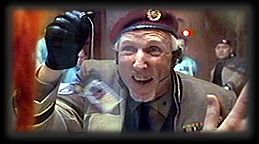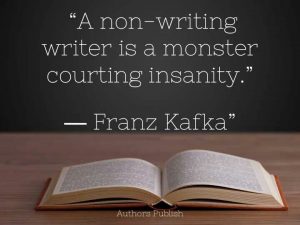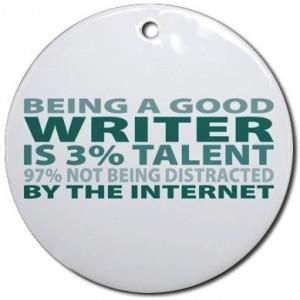 Everyone knows it is easy to write novels and short stories. All you need is a pencil and some form of paper or a computer. That’s the only requirements to become a famous and rich author.
Everyone knows it is easy to write novels and short stories. All you need is a pencil and some form of paper or a computer. That’s the only requirements to become a famous and rich author.
OK, you can stop laughing now.
If you’re seriously considering starting a full-time writing career, there are several seemingly unrelated things you will need to know.
Don’t Quit Your Day Job
Seriously, don’t. Getting a regular paycheck is important for paying your bills and luxuries like heat, shelter, and food. If you have medical insurence, that’s something you have to seriously consider losing, especially if you have a family.
Start writing on the side and keep going to work at your day job. You may find that writing sucks, that nobody wants to publish you, or that you just don’t understand why those million dollar checks haven’t arrived. Only quit your reliable but boring day job when you can consistently bring in more than enough to pay the bills and your significant other (if any) agrees. Sock away some of that money for the stretches when the royalty checks are not coming in on time or the publisher goes bankrupt. It happens, and sometimes it’s a disaster when a big one like Dorchester digs its own grave and takes your manuscript with it.
You Have to Develop Those Social Skills
 Many writers are introverts. I would guesstimate that it’s more like 80% based on the authors I know personally. To get ahead in the writing field, you’ll have to work on interacting with real (not fictional) characters of all sorts. Yes, it’s possible to live in a walled-off room and write novels that make your estate extremely wealthy, but then again it’s also possible that Milla Jovovich would divorce her current husband and marry you. Theoretically in the realm of possibility in a mathematical sense, but not very likely to happen unless you happen to own a ship called the Heart of Gold with an Infinite Probability Drive.
Many writers are introverts. I would guesstimate that it’s more like 80% based on the authors I know personally. To get ahead in the writing field, you’ll have to work on interacting with real (not fictional) characters of all sorts. Yes, it’s possible to live in a walled-off room and write novels that make your estate extremely wealthy, but then again it’s also possible that Milla Jovovich would divorce her current husband and marry you. Theoretically in the realm of possibility in a mathematical sense, but not very likely to happen unless you happen to own a ship called the Heart of Gold with an Infinite Probability Drive.
Nobody Hates You, So Don’t Eat Worms
At some point, you’re going to have to deal with two unpleasant things. The first is rejection. It will happen. Some editor who lucked into several Hugo awards rejects your 680,004 word epic fantasy vampire zombie romance in a post-apocalyptic world. It’s obvious said editor has no clue how valuable your manuscript is after they rejected it without reading even the first page. That’s the last time you send in a submission to Asimov’s.
Normally, an editor rejects a story and NOT you personally. There are exceptions, of course. Maybe you cornered them in a bathroom stall and berated their lack of good taste in epic fantasy vampire zombie romances, or perhaps you threw a glass of (cheap) beer at their face during a convention panel on etiquette. As long as you act professionally and with courtesy, the story you sent in probably fell into one of the following categories:
- They just didn’t like the story. Hey, it happens. This is a subjective profession, so what is rejected offhand is snapped up by another editor and it wins a Bram Stoker Award(tm). Thank them for their time and move on. Send your story to another venue and (most importantly) get back to writing.
- The story was fantastic, but they already accepted a epic fantasy vampire zombie romance co-written short story from James Patterson and William Shatner.
- The story was fantastic, but it did not fit well with the other stories purchased.
- The story was good, but it wasn’t up to the quality of the other accepted stories.
- The story was awful, poorly conceived, and written in crayon on 4ft x 8ft plywood slabs.
- You didn’t follow the posted guidelines. (Wrong genre, terrible formatting with Comic Sans on dark green paper or plywood slabs)
Again, it’s nothing personal. It was a business decision, not a social one. Send it back out to the next venue or do some tweaking and send it out again.
Dealing with Online Characters
 The unfortunate thing about being social with people you don’t know in person is you never know what you’re going to get. Most are nice, decent folks. Some are not, and that tiny minority will make your head explode — if you let them.
The unfortunate thing about being social with people you don’t know in person is you never know what you’re going to get. Most are nice, decent folks. Some are not, and that tiny minority will make your head explode — if you let them.
You need to grow a thick skin as a writer. What some random bozo who you will never actually meet says is not important. Don’t let it occupy your time. You have writing to do, after all. Chuckle, then block them as best as you can. Some will be persistent, trying to get a rise out of you. Do not engage the trolls, lest ye become one of them.
Learn How To Market Yourself
 Marketing is a mishmash of exotic fringe science and voodoo-inspired black magic with a dash of hot sauce tossed in for good measure. You’re going to have to get the basics down eventually, so you might as well get some of the learning underway early in your career. There are lots of books, websites, and YouTube videos to look at. My suggestion is to ask a writer or two that you know personally how they market or brand themselves, or if they can recommend a book or three on the subject. You could always take a course at a local community college so you can SWOT with the best of them. (Go look up what SWOT means. Yes, it’s a marketing term.)
Marketing is a mishmash of exotic fringe science and voodoo-inspired black magic with a dash of hot sauce tossed in for good measure. You’re going to have to get the basics down eventually, so you might as well get some of the learning underway early in your career. There are lots of books, websites, and YouTube videos to look at. My suggestion is to ask a writer or two that you know personally how they market or brand themselves, or if they can recommend a book or three on the subject. You could always take a course at a local community college so you can SWOT with the best of them. (Go look up what SWOT means. Yes, it’s a marketing term.)
Some advice will be worth more than others. Your Uncle Horace did sell nine copies of his boulder erotica, but his ideas aren’t up to par with someone like James Patterson. Keep things in perspective and follow your own instincts.
Nothing Beats BICHOK
In the end, you need to have your Butt In Chair, Hands On Keyboard to become a writer. Your book won’t write itself, unless you’re paying someone to ghostwrite it for you. Celebrities hire ghostwriters all the time. Odds are that you’re not rich enough to hire someone to crank out an 80,000 word novel with the level of quality you need. Ergo, that means you need to work at it. A lot. Expect to crank out thousands of words that will get tossed out in the editing phase. Sometimes you’ll get to the end of a novel and realize that you’ve improved so much that the beginning has to be rewritten.
It’s ok. So are the tears.
If you think you’re ready to dive in, then fair winds and following seas for your new career.